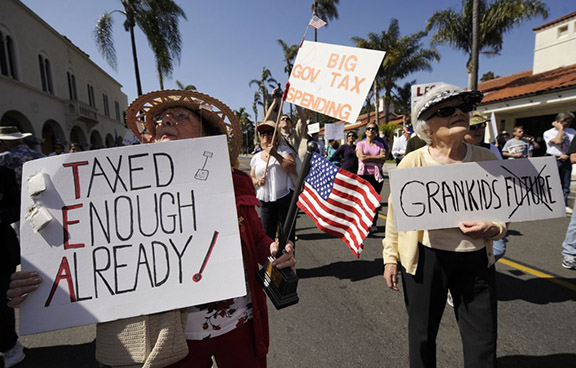By Phillippe Benoit and David R. Hill
Recently there’s been a lot of attention focused on the inequities in our taxation system that allow some of America’s wealthiest to pay very little in taxes. Energy costs are another area that can raise similar concerns because poor households sometimes pay more for energy — certainly as a percentage of their income but also even on a per-unit basis — than higher-income consumers. The Biden administration can take a small but important step to address this problem by establishing a task force to identify where this happens and what can be done about it.
Many studies show that lower-income households spend a bigger share of their income on energy than higher-income households. In part, this is just math: if a grocery store worker making $25,000 a year and an investment banker making $1 million a year pay the same price for a gallon of gasoline or a kilowatt-hour of electricity, the grocery worker is paying a much higher percentage of their income for this energy. Moreover, many low-income consumers live in housing with substandard insulation or older appliances, which can mean they have a higher energy cost burden than wealthier families. This is a problem that adversely affects particularly low-income Black, Hispanic and Native American households.
What is perhaps more surprising is that poor consumers also sometimes pay a higher price per unit of energy than higher-income ones, and in other cases are actually subsidizing wealthier consumers. So just as the poor can face a higher tax rate than the rich, the same can happen with energy prices.
For example, as recently described by the University of California-Berkeley’s Energy Institute at Haas, “net metering” programs — which provide financial benefits to encourage installation of home solar systems — result in energy costs being shifted from higher-income consumers to lower-income ones who can’t access these benefits (e.g., because they do not own houses with large roofs). Simply put, poorer people pay higher rates because of benefits flowing to those with higher incomes.
Another example are the efforts by utilities and regulators to use fixed charges rather than volumetric rates to recover revenue from electricity customers. Because poor people use less energy, higher fixed charges can mean the poor pay more for their electricity on a per kilowatt-hour of use basis than higher-income consumers.
What may seem like small amounts to some are often significant for poorer households or when the aggregate impact on all these households is considered. For example, 25 million American households sacrificed food and medicine purchases to pay energy bills. Once again, Hispanic and racial minorities were hit hardest.
To address this problem, here’s what needs to happen.
The critical first step is to identify those instances where the poor are in fact paying more for their energy or where costs are being shifted from rich to poor. Cataloguing these will be difficult, in large part because of the complex calculations required, but also because there are vested interests who benefit from the current system and will resist efforts to change it.But cataloguing prices and cost shifts is not enough. People pay for electricity not for its own sake, but because they want a cool house in the summer, a warm home in the winter, cold beverages in the refrigerator, etc. Poorer families living in homes with inadequate insulation, or with older and more inefficient HVAC systems and appliances, use more electricity to get the actual energy-supplied services they want and need, as many reports have shown. This issue is already being addressed under certain governmental programs, but more needs to be done to remedy the disproportionate energy burdens faced by poorer families.
The second is to answer the question “why is this happening?” In some cases, the driver is government regulation. Often, the regulation may have a laudable purpose such as incentivizing renewables, but it can end up shifting costs to low-income consumers or making them pay higher per-unit costs than wealthier consumers. In other cases, the cause may not be regulation, but the government is well placed to address the issue (e.g., energy efficiency investment programs for low-income families).
The third step is to identify pragmatic and implementable solutions. Sometimes this may be a technical exercise (e.g., revising regulatory cost methodologies). In other cases, the best solution may not involve undoing the burden, but rather compensating poor families in other ways. These distributional efforts should be complemented by initiatives to reduce energy costs overall to alleviate the expenses borne by the poor.
So, what can be done? President Biden should establish a task force, led by the Secretary of Energy, to address this energy burden faced by low-income families. The task force should produce within one year a report making recommendations for consideration by the administration, Congress and the states.Now is an opportune time to address this issue given the rising interest in energy justice and the disproportionate burdens faced by disadvantaged American families. Moreover, the extensive review and restructuring of energy-related policies and programs being undertaken to meet the challenge of climate change also provides an opening to tackle the energy system’s adverse impact on poorer families.
Ultimately, more than rectifying inequities in the energy cost structure, this effort is about trying to find ways to empower poor people to spend more of their own resources on adequate housing, transport, leisure and more, without overpaying for energy. The Biden administration should launch this effort now, so America’s poor can benefit as quickly as possible.
Philippe Benoit and David R. Hill are both adjunct senior research scholars at Columbia University’s Center on Global Energy Policy. Hill was previously general counsel of the U.S. Department of Energy and of NRG Energy, Inc. and is currently a principal at Newlin Road Advisors. Benoit is managing director, Energy and Sustainability, at Global Infrastructure Advisory Services 2050. The views expressed are those of the authors in their individual capacities.


